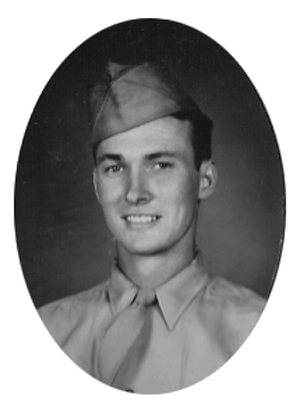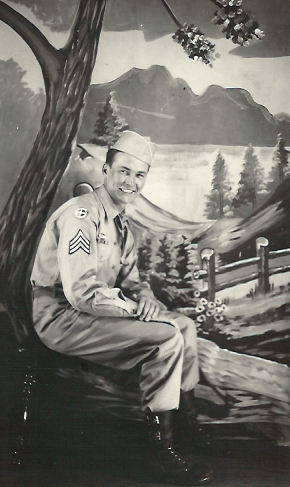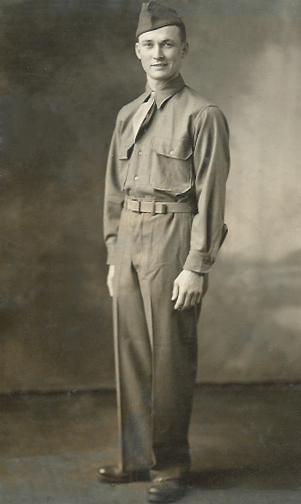 |
134th Infantry Regiment"All Hell Can't Stop Us" |
 |
 |
134th Infantry Regiment"All Hell Can't Stop Us" |
 |

John Robert (Bob) Sirk , now age 94 and living in Grant County, Indiana, was a
Huntington County Indiana farmer and father of a two-year-old son when he was
called to serve in World War II in early 1944. He
and a high school friend, Paul Forester, left from the Huntington, Indiana,
train depot for Fort McClellan in Alabama.
Dad never talked about his WW II experiences to anyone.
His four children knew he had been in the war only because he had a
crippled hand where he had received shrapnel wounds.
In 1994 when he received a mailing from James Graff of Middletown, Illinois,
about the Fiftieth Anniversary of the Battle of the Bulge, he expressed some
interest in attending this memorial service which was to be held in St. Louis,
Missouri. Our mother, Evelyn, his
wife of fifty years, had passed away the year before, and this may have had some
influence on his need to revisit with the past.
He traveled to St. Louis in December of 1994 with his oldest son Joe and
his daughter Sue. The three of us
had no idea how we were going to connect with Mr. Graff or anyone else from the
35th Division. As we were
in line to have dinner right after our arrival, two couples were leaving the
dining room and passed right beside us.
I happened to read the nametag of one of the men and, to my astonishment,
it was James Graff. After that
meeting the rest of the weekend was spent making connections, exchanging stories
and information, and forming what was to be a friendship which lasts to this
day. My brother Joe, who was a
history teacher and avid scholar of World War II, sat in rapt attention as these
men of the 134th Infantry poured forth amazing and, previously
unknown to us, powerful recollections of the Battle of the Bulge and the events
leading up to it. One very curious incident occurred during this trip to St.
Louis when the three of us were at the famous St. Louis Arch.
Since each of the cars carrying tourists to the top of the Arch held four
people, there was a fourth person in our car.
Joe recognized him as the historian Stephen Ambrose.
When Dad was introduced to him, he asked Dad about getting replacement
boots during that terrible winter, and Dad replied that he did get new boots but
only because he had very small feet.
This convinced Ambrose of Dad's account of his experience, since he knew that
those soldiers with a more common shoe size had a much more difficult time
getting dry boots, and, as a result suffered terribly from frostbite.
After attending the Fiftieth Anniversary of the Battle of the Bulge in St. Louis
in 1994, he has made it a point to talk with his children, grandchildren and
great-grandchildren about his war experience whenever he was asked about it.
He recounted his experience to the Veteran's History Project sponsored by
Senator Richard Lugar, and he has returned to the sites of his experiences in
1944 on three occasions. In 1985, he returned to France, Belgium and Germany
with his daughter, son-in-law, and grandson.
In 1998, he and his son Joe joined a group of veterans from the 35th
Division for a return trip to Bulge sites, and in 2004, he and his daughter went
on the 60th Anniversary tour organized by the VBOB.
One of Dad's most vivid memories of basic training wasn't of weaponry or
strenuous physical demands, but of sharing a hut with some fellows from Kentucky
and Tennessee who had never had formal schooling, and, for whom, some of the
basic literacy skills were challenging.
If all of them could not write their names or memorize their serial
numbers, they all had extra latrine duty.
In the fall of 1944, after being shipped to England where, according to his
memory, he walked down the gangplank of one ship and immediately up a gangplank
of another, he was among the group whose arrival on Omaha Beach was the last to
be landed from a landing craft - an LCI.
They
waded through water and climbed the steep cliff to a
replacement camp on top of Omaha Beach, and he vividly remembers it was midnight
before he got dry. His group
proceeded forward on a "40/8" cargo car
to Nancy, France, where, on November 18, 1944, he joined the 35th
Division, 134th Infantry, Company C. He began the march through
France, to Morhange, where on November 22, the first battalion in reserve, of
which he was a part, ate a Thanksgiving dinner.
Near the town of Puttelange, with Capt. William N. Denny commanding
Company C, Dad remembers moving into
the first of the Maginot Line bunkers.
One of the most intensely painful events of Dad's march through France before
the outbreak of the Battle of the Bulge occurred as his company was approaching
the town of Fraunberg near the Bleis
River. His group had stayed in a
house with an actual bathroom the night before moving forward across a sort of
railroad yard with several sets of tracks.
As they crossed this area with no cover, they came under fire.
They then prepared for the crossing of the Bleis River from Sarreguemines
on the French side to Habkirchen on the German side in engineer assault boats.
The first boat which started to cross leaked and rapidly took on water,
so it returned, and the rest of the guys "took off back to the house" where they
had stayed the previous night. Capt.
Denny told Dad to get in his boat and go with that second group of men.
Dad had already lost his warm overcoat (later seen as good luck because,
had it been on, it would have dragged him down in the later river accident).
They started across the river which had
been dammed up, but the boat capsized when it hit a concrete abutment and went
down just as they came under fire. He was
able to grab hold of a low hanging limb, but another man grabbed his legs, and
they both went in the freezing water - winter clothing, rifle, everything.
Having no heavy overcoat probably saved
his life, and he and a small group of men from Company C made it to shore and
went up the bank into a house in Habkirchen. At this time the German defenders
were awakened, and Companies C and D were all alone with no supplies--no heat,
no food, no way to dry out except by just wearing the wet clothes.
Because he was wet and had no rifle, he was eventually sent to the
basement to guard prisoners which had been taken as they gained control of this
house. Someone had given him a
handgun, and, as he was at his assigned station, an officer came downstairs.
When Dad asked him for the password, his response was, "Damn it, soldier.
I forgot the password." Because
there were a few soldiers from Company B in another house across the street,
some of the guys went over there while
maintaining radio contact between the two houses.
In the meantime there was enemy fire, and, because the bridge had
collapsed, a reduced number of Companies B and D joined
most of those who had
survived in Company C in this house. Denny sent some, including Dad, over to
help the Company B guys in the second house across the street, but they came
under enemy fire and were ordered to return immediately.
At one point during this time of action
in Habkirchen, there was a sort of temporary truce after a particularly vicious
exchange with the SS troops (who had refused to be taken prisoner along with the
other Germans in the basement), and, according to Dad's memory, a German doctor
who could speak English was allowed to enter the house to attend to the German
prisoners and was afterward allowed to go back.
Ultimately, Capt. Denny had 21 men left in the house with about 65 German
prisoners in the basement--a portion of the few Germans
who had hoped to hold on to this spot in Germany.
By this time, Dad was back up in the top story when a large group of
60-70 SS troops came down the street.
It was getting darker and, when ordered to fire on them, the enemy could
see flashes of the guns and returned fire.
Dad and another soldier crawled on their stomachs down the stairs to a
lower level as the Germans fired into the upper story. When recounting this
event to his oldest grandson, Scott Sirk, he found it very painful to recall
firing at the German soldiers and living with the guilt he felt about killing,
even though killing the enemy is a part of war.
The next day, by which time Dad had gotten a winter overcoat and rifle, probably
belonging to a casualty, they were sent out to take the high ground
above
this town of Habkirchen from which rounds of 88 artillery had been firing down
into the town and to the house where what was left of Company C and a few of
Company B and D were. This fire was
probably from the 17th SS Panzer division which were in the nearby
woods. As they made this approach, they again came under enemy fire and were
ordered back immediately. Dad and another infantryman named Pulaski, a great,
oversized guy, both started running back to safety, and the big guy yelled,
"Sirk, you're not leaving me behind, you little shit!" and started ditching his
gear to keep up.
Finally, 17 more prisoners from this panzer division were added to the big group
of 60-70 already in the basement.
This action garnered Company C a presidential citation after the war.
In this action, over three days, there were 680 wounded or injured and 142
killed, necessitating reinforcements of around 500 men as replacements
At the fortress city of Metz, Dad's unit was relieved by 44th
Infantry Division. At this same time
- the 15th, 16th, and 17th of December, 1944,
100 miles away, Germans were starting the Ardennes Offensive, later known at the
Battle of the Bulge. It was about
this time that General Patton hurriedly turned his army around to head to
Bastogne.
Back in Metz, Dad and others got showers.
Dad recalls standing in freezing water with warm water pouring over his
head. He then received replacement
boots of rubber,
but only because, being a smaller, wiry guy who had small feet, these better,
warmer, sturdier boots near his size were available.
Others with bigger feet had to take canvas ones and later got frostbite.
Within a short
span of 13 days, everyone else in Dad's squad had been replaced, and Dad,
as a result, had the longest combat experience, so was named squad leader after
just this short time; however, his promotion to staff sergeant didn't come
through before he was wounded and sent to a hospital UK.
When the German offensive, later known as the Battle of the Bulge, broke out,
what was left of Company C were ordered to Bastogne. After Christmas day, Dad
and others were trucked to Arlon.
The next day, December 27, they were
marching alongside tanks from the 4th Armored Division which were
trying to keep the road open so that supplies and reinforcements could reach
Bastogne. By December 30, Company C was
in the tiny village of Marvie, very near Bastogne. Dad's unit had relieved the
101st which had dug in and
spent two to three weeks around Bastogne holding the German offensive at bay.
It was the job of the 35th
to continue to hold this spot from the Germans. It was on this day that Dad
received the wound to his right hand from an 88 artillery shell
as he was running back to his foxhole
after being sent forward to assess the range of the US guns. The Germans were
ensconced across snowfields and meadows, and Dad was told to go down a fencerow
to see where Allied mortar fire was
landing so he could tell his unit whether they were hitting long or short.
He had done two trips, getting close enough to hear Germans talking
very late at night and was returning from the third just as dawn was
breaking. In this light, the Germans
spotted him and fired. When he heard
the 88 artillery coming in, he
jumped into a foxhole, but was hit in the right hand by exploding shrapnel from
the shell.
When the medic came to help him, he said to Dad, "That's a million dollar
wound." Dad didn't know what that
meant, only that he was hurting. He
was taken back to a field hospital and, from there, transported to a hospital
near Exeter, England. Because he was
mobile with no injury to his legs, he helped other wounded soldiers in various
ways. He has a vivid memory of
waking up after surgery there and looking at a brace on his arm where he read
"W.E. Zimmer Mftg, Warsaw, Indiana."
After his horrifying and traumatic experiences of recent weeks, he felt like a
little piece of home had come to his aid.
Many years later, Dad and Mother stopped by the Zimmer Company in Warsaw and
related this story. Dad was asked if
by chance he still had the brace because they would have loved to have it as
part of their historical display.
When the subject of his World War II experience has come up in the recent years
when he was willing to talk about it, he always says, "Well, I was one of the
lucky ones." He seems to have spent
his life believing he was afforded a certain grace, and he has lived a very
modest life of quiet gratitude and deep appreciation for just being alive. He
never complained about tenant farming for over sixty years in all kinds of
weather; each day out in the fields or
working among animals reminded him that his life was a gift.
 |
 |
Thanks to Sue Landaw, Sgt. Sirk's daughter, for the pictures and informaton about her father.
|
Sign Guestbook
|